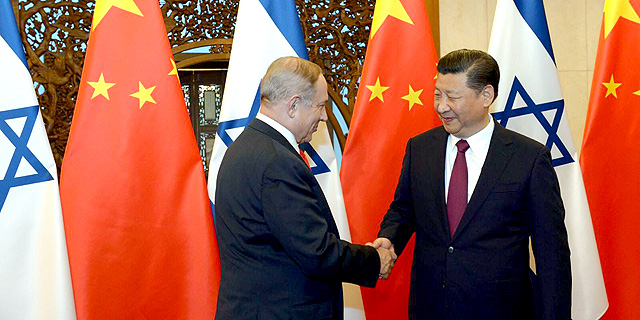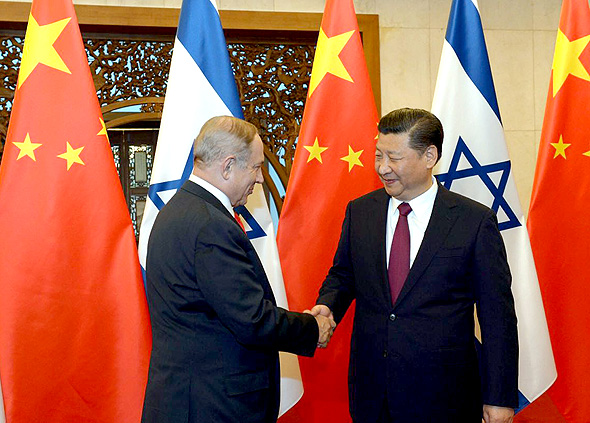
Analysis
Soaring Israel-China Trade Leaves Netanyahu Exposed to U.S. Hawks
New official data shows that Israeli exports to China reached $2.8 billion in the first half of 2018, a 73% increase compared to last year. The U.S. may eventually look at growing ties between the two countries as undermining White House efforts to curb Beijing’s influence
Asaf Shalev | 17:00, 26.07.18
Chinese investors have a voracious appetite for foreign investments with a particular interest in the technology sector. Measuring the extent of spending is impossible because many of the deals are private and because of efforts to mask the identities of the Chinese investors. But with the Chinese government directly controlling a large portion of the country’s companies, it has been clear that Beijing is accumulating significant foreign assets.
For daily updates, subscribe to our newsletter by clicking here.
In the last few years, China and Israel appear to have found willing partners in each other. Israeli startups and mature companies supply the technological innovation and China provides the capital, manufacturing capacity and customers.On a visit to China last year, Israeli Prime Minister Benjamin Netanyahu called trade relations between the countries “a marriage made in heaven.” He has repeatedly praised the potential of increasing economic ties and tends to take meetings with visiting Chinese business executives, a recent example being Jack Ma, the head of e-commerce giant Alibaba.
Israel-based market research firm IVC took a crack at quantifying Chinese investments in the country’s tech scene earlier this year and found that investments with Chinese participants ranged from half a billion dollars to $600 million in each of the last three years. IVC found that Chinese investors, many of whom are connected to the state, focus almost exclusively on strategic investments in Israel, seeking to incorporate technology into their own businesses rather than capital gains. New data from Israel’s Central Bureau of Statistics shows that Israeli exports to China reached $2.8 billion in the first half of 2018, a 73% increase compared to last year. China was the destination country for 8.7% of Israeli exports for the last six months. These figures do not include trade with Hong Kong. Exports to the Chinese semi-autonomous region in the first half of 2018 were valued at $2.2 billion, only a slight decrease from last year. The cozying up between the two countries may prove to be awkward for Netanyahu in his relationship with the White House. Since his election in 2016, Trump has appointed an ambassador friendly to Netanyahu's West Bank policy and formally relocated the U.S. embassy from Tel Aviv to Jerusalem, a goal long sought by the Israeli prime minister. Trump also withdrew from the Iran nuclear deal in an endorsement of Netanyahu’s position. Trump’s willingness to make overtures to Israel has run out on minor issues as when the U.S. president refused to grant Netanyahu’s request for exemptions on steel and aluminum tariffs—minor because these are not significant economic concerns for Israel. Netanyahu, therefore, has worked to be a close friend to both foreign powers— two countries that now appear to be locked into a trade war with each other. In a long-anticipated move, Trump recently decided on $50 billion in tariffs on Chinese imports. His administration has cast China as an unfair economic actor that is trying to siphon away American wealth and technology for its own benefit. At least on the issue of Chinese acquisition of U.S. technology, Trump has allies across the aisle. The Committee on Foreign Investment in the United States, a federal body known by its acronym CFIUS, has been cracking down on deals with Chinese investors that are deemed to be against the national interest. Congress recently passed the Foreign Investment Risk Review Modernization Act, which empowers CFIUS to review and block attempts by Chinese investors to gain even a minority stake in U.S. companies. The worry is that Beijing is using these deals to gain access to the critical knowledge that gives the U.S. a military and technological edge. Israel would seem to offer China a more accessible repository of technology. But there are murmurs that suggest Israel should tread with caution lest it pushes its luck with the White House too far. Last week, conservative commentator Tom Rogan wrote a column in the Washington Examiner entitled, “Trump must warn Israel on its China trade.” He cautioned that Israel’s “rapidly growing economic relationship with China must not come at the expense of U.S. security and intellectual property interests.” “With time, unchallenged by the U.S., Israel will have little reason to prevent U.S. technologies from falling into Chinese hands,” Rogan wrote. “That means a major undercutting of U.S. military capability.” Israel may have already heard the message. A few months, ago Netanyahu directed his chief economic adviser Avi Simhon and national security adviser Meir Ben-Shabbat to design a mechanism for reviewing foreign investments in Israel, Israel’s Channel 10 reported in July. According to the story, Simhon informed lawmakers of the plan during a confidential parliamentary committee meeting. The discussion among Simhon, other government officials and lawmakers revolved around the question of China and Trump’s tariff policy, according to the report. Contacted by Calcalist on Wednesday, Simhon declined to comment. A spokesman for the parliamentary committee declined to comment. The Israeli Prime Minister’s Office has yet to reply to a request for comment by Calcalist.
No Comments Add Comment